#you essentially turn her and her horrific situation into a meme
Explore tagged Tumblr posts
Text
I need the true crime fans to learn how to rub two braincells together to spark some intelligent thought
#you spend months hyping up this woman to get out of prison#and treating her like an icon or an influencer and ‘stanning’ her#using the same language to talk about her that you do to talk about your favorite pop stars#you essentially turn her and her horrific situation into a meme#she finally gets released from prison. after a lifetime of abuse and isolation and horrendous treatment she is free#you celebrate for about a week once again treating her like some kind of influencer and hyping up her every action#and now that the excitement has died down it’s suddenly#‘I was a huge supporter of her but idk there’s just this off vibe about her :/‘#like oh really. really. is the woman who had to plan a desperate act for escape her situation. off????#I knew this was going to happen. I knew y’all wouldn’t leave her the hell alone#she’s been victimized her whole life and now that she has a chance at a normal life#y’all are gonna tear her apart the moment she does something that doesn’t fit inside your narrow view of who she should be
3 notes
·
View notes
Text
Alex ze Pirate Mini Review 4: The EED: Emotional Exposition Dump. Or why THIS is not friendship
So here we are. The last part of this 45 page three parter, meant to be about what Sam really means to the crew. And what have we seen so far in the previous parts? That Sam is not just their underappreciated, but downright exploited slave (yeah, did you know that in ancient Greece slaves supposedly had more rights than Sam in this one? At least they could buy out their freedom one day), that Dobson has no idea how to genuinely pace a story, turning what could have been a decent 100 page story if planned out and presented with more care into a 45 page short snore fest and that Hat Andy’s idea for jokes are either based on abusing token buttmonkeys, turning annoying memes into even more unfunny jokes or making dark comedy with dead orphans.
At least when South Park makes jokes about children dying, they are appropriate in that dark setting and the death is still in some way handled or refered to as a horrific event. In Dobson’s case however, it just leaves a bad taste in everyone’s mouth.
Sorry, I just can’t get over the orphanage thing. If Dobson wanted the reason for Sam leaving be that he finds out someone he cared about from his old life is dead, that is one thing. But did this asshole have to destroy an entire building with countless victims to do it? Couldn’t he just have one person die and the rest be still at that place? Honestly, I think it would have been funnier and more meaningful emotionally, if Alex and Co actually interacted with people from Sam’s past and in doing so learn more about him as a person, by genuinely visiting a still standing orphanage. Give the comic some meat on the bones and in doing so actually create the impression this comic is truly about Sam and not just about characters doing random stuff in relation to finding him. Instead Dobson goes for a literal overkill, which he then does not even treat as a tragedy but as a joke.
Dobson, THIS is a better and more dignified joke about orphans than the shit you did.
youtube
You got outclassed by Chuck Lorree of all people on this planet, you disgrace of a storyteller. A storyteller who can’t even keep his own barely existing continuity in the Alex-verse straight, now that I think of it. After all, according to Legends, the orphanage was closed and all the orphans were sold out to others, with Sam being the last of the litter
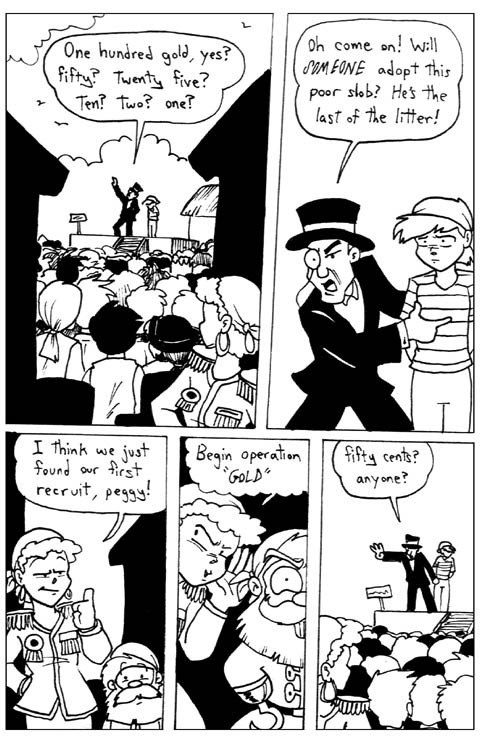
Which again is just unintentionally more horrific than Dobson likely intented. But you know, dumb people don’t know when they do dumb shit.
But I digress Let us just get into the last part. In which we finally see the “emotional” pay off of everything that happened so far.
Spoilers, this is my reaction to that pay off.

And here is what everything led up to now.

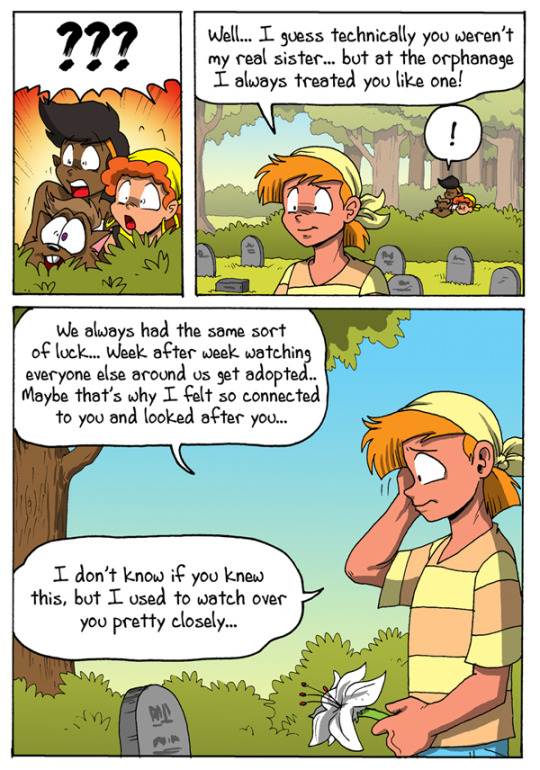
Sam ran away, because he wants to say his final farewell to his sister figure, we never knew about at all and about whom we do not learn one single thing really.
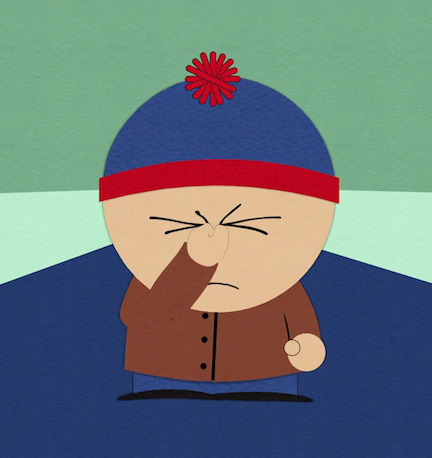
Where do I begin with how this revelation fails?
Let’s start with the fact that this in execution does not have the emotional impact that was intended. And why is that? Because Dobson doesn’t bother to actually introduce us to the sister as a character.
If I may digress a bit to talk about One Piece here: In the manga, oftentimes Oda will “interrupt” an ongoing story arc to feature flashback chapters, through which he tells about past events referenced in the “present” chapters prior. Through those flashbacks he further gives meaning to why in present time the characters facing certain foes or having to win in their current situation, is so important, even on an emotional level. In short, those flashbacks are no interruptions, they are integral in giving those story arcs emotional weight.
Because now we are not just “told” why we should care about things and people, we have been shown why we should care. The old rule of “show, don’t tell” being followed on.
A good example from a more “recent” storyline I can think of, is through the flashback chapters of the Dress Rosa story arc, where we are not only being shown how De Flamingo took over the kingdom of Dress Rosa and brought pain and misery over its people for years to come, but also the past of characters such as the gladiator Rebecca and Mr. Soldier, her father figure that raised her up from the time she was 10 and De Flamingo took over… only for the flashbacks to also reveal properly how Mr Soldier is not just a father figure for her that took her in, but her biological father Kyros, who had been turned into a toy by one of De Flamingo’s henchmen via a power, that also took Rebecca’s memories of her dad away so she never identified the toy as her dad.
This way Oda achieves multiple things at once; Among other things, he establishes how evil De Flamingo is, how tragic Mr Soldier and Rebecca’s lives really are, adding to us the readers wanting to see them and Luffy beat De Flamingo into a pulp and it makes the later “present day” moment when Mr. Soldier and many other victims turn back to normal and Rebecca regains her memories and is reunited with her dad so much more sweeter. Cause now we care.
Truth be told, I myself believe that Oda is one of few storytellers on this planet, who truly has “mastered” the technique of emotional flashback storytelling.
A technique Dobson could have used in this part of the story, but didn’t. Cause honestly, the way he tells how Sam’s sister was “important” to our poor cabin boy is not emotionally engaging from a storytelling perspective. We are told she is important, but we learn genuinely nothing about her, not even what her name was and what she looked like except from that one picture in the locket from over 15 pages ago. Nothing about how “close” she and Sam truly were is revealed through showing, only telling and as such we don’t even begin to care for her relationship with Sam and how her loss is genuinely important to him. So the main goal of this story, to make us the readers feel something for Sam aside of pity for how he is treated by his supposed friends, has not been achieved.
… Dobson, you are a hack. You can’t even use flashbacks, a basic technique in the realm of storytelling, to show us why we should “care” more, heck, even at all, about Sam and his loss.
If you just had adjusted a few things, you could have had something good here.
By adjustments I mean the following: Take the first page of this chapter as well as the first panel of the second page, and combine them into the final page of the previous chapter. In doing so creating a proper cliffhanger for part two. Then start chapter 3 of with a few pages (lets say 6 or so) showing young Sam and his sister interacting in the orphanage in doing so turning her from a nameless plotdevice into a genuine person to care about. And then use content of page 2 and 3 of this chapter, to elaborate on their relationship, potentially with small cuts always between present day Sam at the grave explaining himself and saying his farewells, with pictures of the past showing what they meant to each other.

But nope. This very basic idea a fanfic writer now has come up with, a fanfic writer who never studied literature or took writing classes by the way, something I doubt you did at college the more I read your work, has never crossed your “superior” mind.
Also, I find Sam’s text on page 3 really, really backwards in a way. Like, I get that we are meant to consider it a good thing Sam is this way. You know, being genuinely selfless and wanting to make others happy. And don’t get me wrong, generosity and selflessness are virtues I hold in high regard. But the way Sam talks about how he just wanted her to be happy while sacrificing any fulfillment of basic needs for himself feels more like a pathological disorder in that case than something to reach for. In fact, psychology speaks from different forms of generosity and the thing Sam describes here is likely “compulsive giving” or “unrelenting generosity”, a pathological variant that can be highly toxic for all people affected by it.
Funny how Dobson, a person who wants to claim he is all for mental healthcare, is essentially “promoting” the positivity of a psychological disorder via Sam.
Then again, this also feels more like Dobson putting words into Sam’s mouth (in a literal sense) to retroactively make Sam’s treatment look less horrid. Cause now Sam doesn’t just do all the work because he is ordered around, he deep down is “happy” doing all of the work and gain not even some basic respect in return, because he cares so deeply for his friends.
… I feel myself get livid again here.
And the next few pages don’t really help me “calm down”.
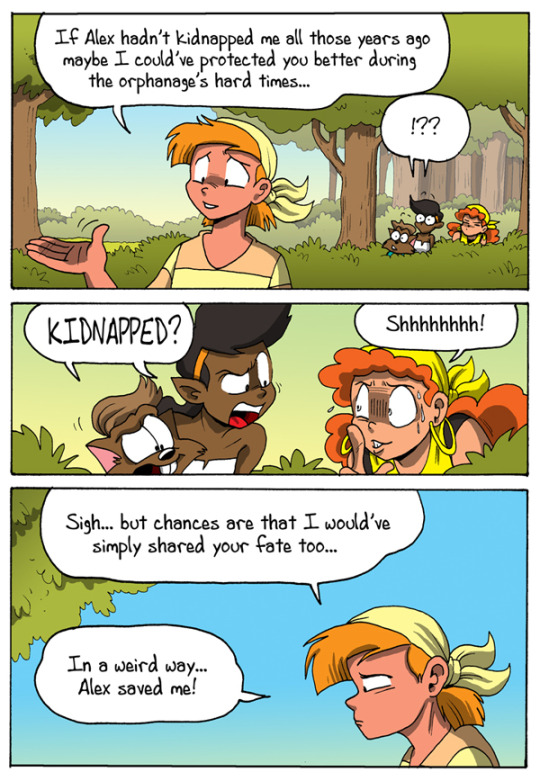
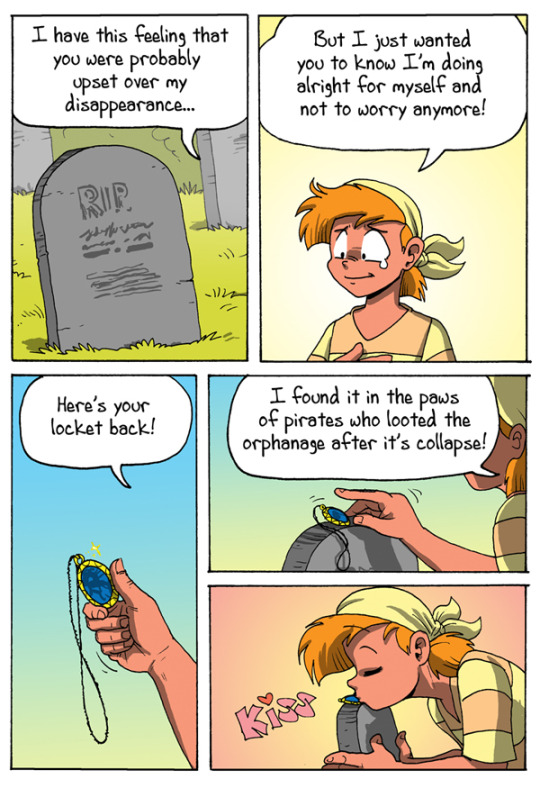
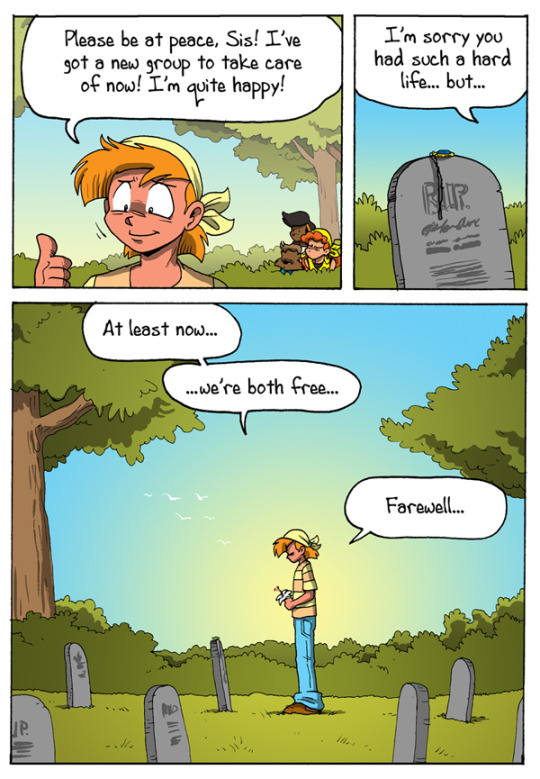
Cause now the “justifications” just go on. The thing that is meant to be a heartfelt farewell turning into Sam “justifying” that hey, it must be good that he ended up with Alex and her crew. Cause after all, by being abducted years ago and being treated as a slave who in the ginger’s eyes is worth less than lint, he likely avoided dying of shitting his pants and a crushing roof. Ignoring the fact that he was going to be sold out anyway back then and would have potentially ended up with a more generous master than the crew of non Captain Syrup.
Also, just all of the shit going on in page 6. Sam asking his “sister” to be at peace, when likely, if the girl could still talk, she may even just ask Sam the following: Who the heck are you. Cause really, if you think about it, if Sam did all the nice things for her in secret, did the girl even realize she had a “big brother” figure to watch over her? Also, him saying he is happy and he is doing quite alright for himself?
All the pictures of him sighing and looking in misery in this story alone, plus the cavalry of strips I posted about how Sam is abused in the first part of this post series tells me another story.
Finally, Sam’s message “At least now, we are both free”? Sam, she is dead, likely having died in pain when a house crushed on her, weakened by a deadly disease and traumatized by other children around her dying of said disease. And you are stuck with a bunch of people that haven’t shown to care for you up until this story and the only reason they may even care for you now is out of “sympathy” because you lost your sister figure, not because they genuinely love and care for you as a person. As far as I am concerned, you would be better off being the slaveboy of some nymphomanic pirate princess in the world of Berserk than you are on this plane of existence.
And now that the “emotional” farewell is out of the way, Dobson can go back to focus on the characters he really cares about in this shit anyway: Little Bitch Annie, lesbian chocolate rain Miroku and Deadpool’s pubes.
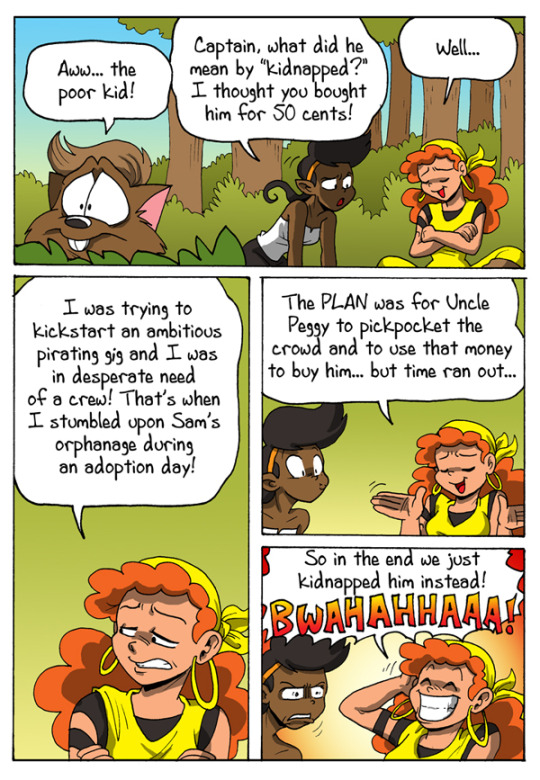
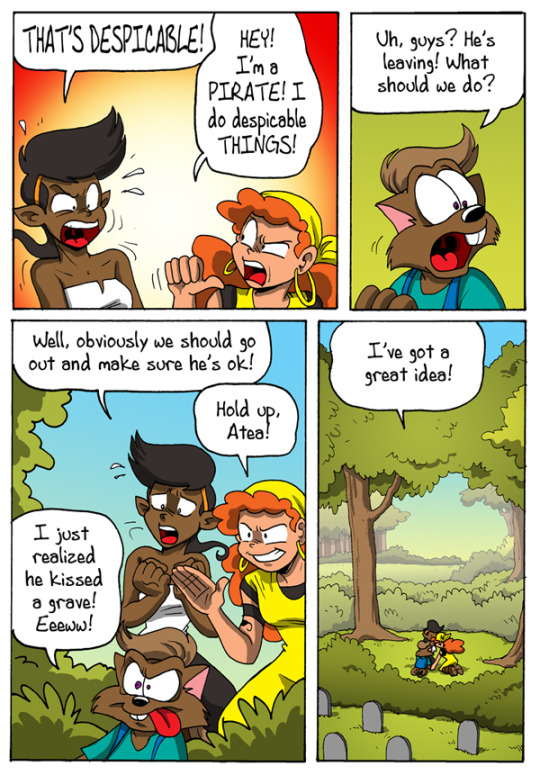
Oh Alex, you are such a rascal. You really make me want to shoot you with a crossbow, stab you in the eye, hurl you out a window and shove explosives where the sun won’t shine.
Yeah yeah, you are a pirate, but that doesn’t mean you need to be that awful as a person or even protagonist.
Christ. For someone who complains how toxic Walter White is to the point he believes “sympathizing” with the character turns you into a nazi, Dobson certainly is blind to how awful Alex really is, particularly as protagonist in a comic series intented for little kids. Compared to her, I can think of freaking slasher movie villains with more of a moral compass. Like say what you want about Jigsaw, at least he never victimized genuine children or teenagers.
And Talus, thanks for ruining the “emotional” moment Sam “earned” by pointing out how weird it is he kissed a gravestone. Also, I am glad I know what happens in the next pages or else I would assume Alex’s great idea includes to dig up his sister and turn her into a life sized doll for Sam to cuddle.

No, their ideas to assure he is emotionally save and to redeem themselves for years of taking him for granted/hurting him, is to throw him a surprise party.
… you know, I think you may be the only individuals in fiction, that Pinkie Pie would think do not deserve to throw a party or get one thrown for.

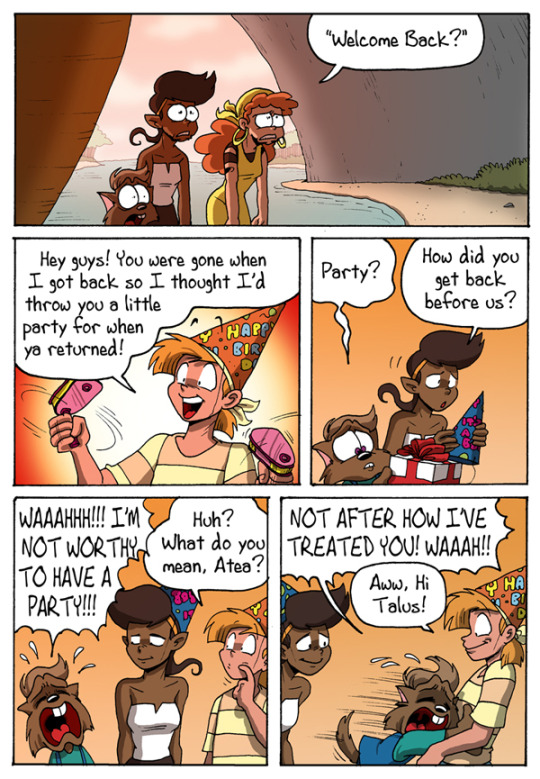
But I guess Sam is just so nice, he even throws you a party for no apparent reason.
Either that or now that his “sister” is dead he will overcompensate even more and this is the next destructive stage of his compulsive generosity.
… Sam, I am sorry for your loss. But you need to get help. Once by the authorities who will hopefully get rid of Alex and then by some psychologist who helps you redefine your own self worth.
By the way, I find it funny that the banner he made also actually only mentions Talus, Atea and Captain Daphne with a bad hair day. It just confirms that Peggy either never bothered to join the others or that Dobson developed an early onset of dementia and totally forgot about the fact that the midget is a genuine character in this trainwrack. And I am convinced the later is the case, which really just makes me wonder how someone is able to do that. To forget a major character of the thing they create and want to turn into a money making franchise. Imagine if Disney did e.g. a sequel to Snow White and the Seven Dwarves, only to forget about the god damn dwarves themselves.
At least Talus finally realizes he is unworthy to get a party thrown or be Sam’s friends. Good. Now jump into a wood chipper and free ourselves from your existence you dog beaver thing.

Content of the next page in a just alternate universe… Alex: You are a better human being than I could ever be and this is all because my creator is a hack who does not know how to create genuinely likable personalities.
The reality:

FUCK YOU, ALEX! FUCK YOU AND THE BIKE PUMP YOU FLEW IN ON! Atea and Talus have learnt more than you about what it means to be a friend and they don’t even bother to punch you in the face for still being the biggest red haired raging cunt since Asuka from Neon Genesis Evangelion.
If this is how Dobson thinks “friends” should treat each other, it is no wonder he has a friendless background. Hey, Hat Andy, if you want to emulate manga, may I suggest you just become even more blatantly about it and simply copy paste One Piece? Cause Luffy at least knows how to be a friend. How much does he care for his friends, strangers and even at times former enemies of his?
He cares so much, that e.g. when a special military force that beat the crap out of him got hands on his crewmate Nico Robin, he did THIS:
youtube
He declared war on the world government. Fuck, even Jack Sparrow, who is an opportunistic jackass, in a movie where everyone stabs the others at least three times in the back, was less selffish than Alex, when he gave up his chance on immortality as Captain of the Flying Dutchman, just so Will would live in some form.
Metalbeard from the Lego Movie cared more about doing the right thing than anyone in Alex the pirate did. You created the worst friends and “heroes” I have ever seen in a webcomic since the entirety of sinfest. Congratulations for that accomplishment, Dobson. It really takes a special kind of anti-talent to show such level of not understanding the power of friendship as one of the most basic tropes in storytelling, to the point a show about pastel colored equines managed to profit of it for nine years.

WOOOOO! We are the worst, we are the worst!
And look, Uncle Pennywise’s scrotum is back.
Anyway, here are the last two pages of this thing, to end on what is meant to be a whimsical note because Sam actually gets something from Alex that is not a beating or verbal abuse.
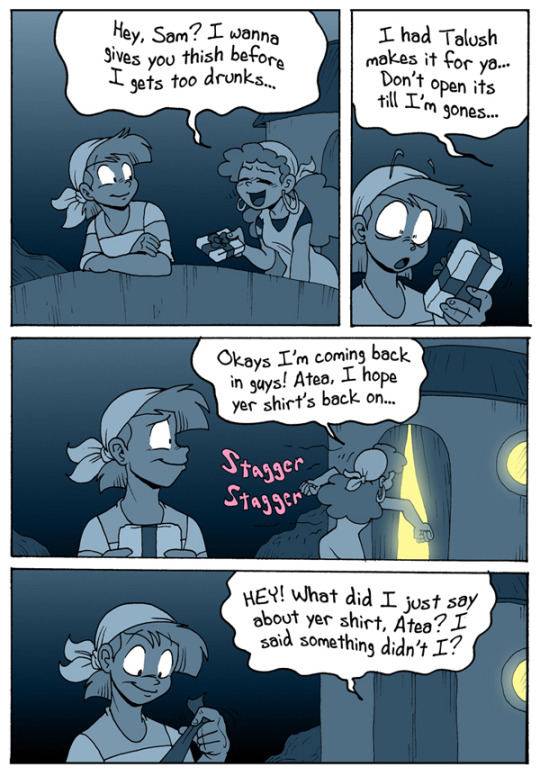
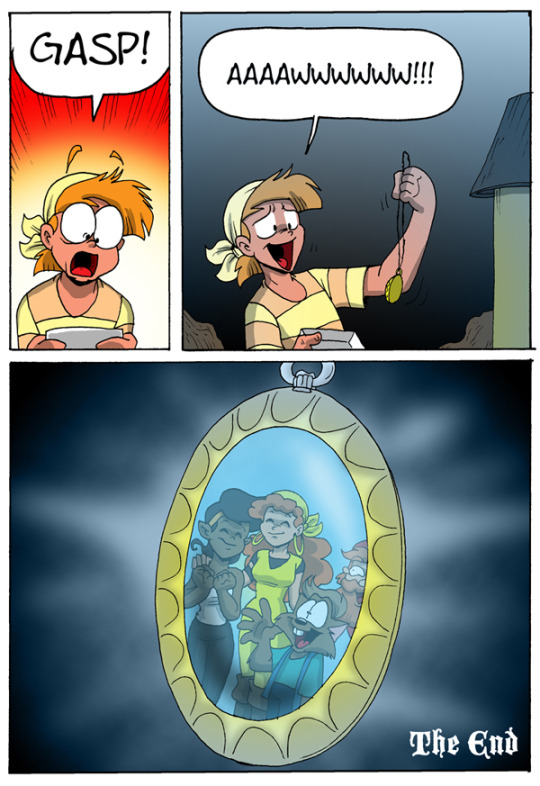
Too bad anything that would feel heartwarming about this is drowned by a) me actually remembering all the shit Alex, the crew and the writer pull to get to this point (from abusive neglect of the characters to pathetic emotional manipulation on a narrative level) and b) the weird rapey face Uncle Peggy makes in the picture. Like Jesus, did Dobson try to emulate the Burger King here?
But hey, this story is over. And who knows, perhaps from this moment on, Sam will actually be treated better overall in the comic and Dobson will spend time actually developing an overall plot and the world of this com-
Tom Kenny: ONE COMIC STRIP LATER
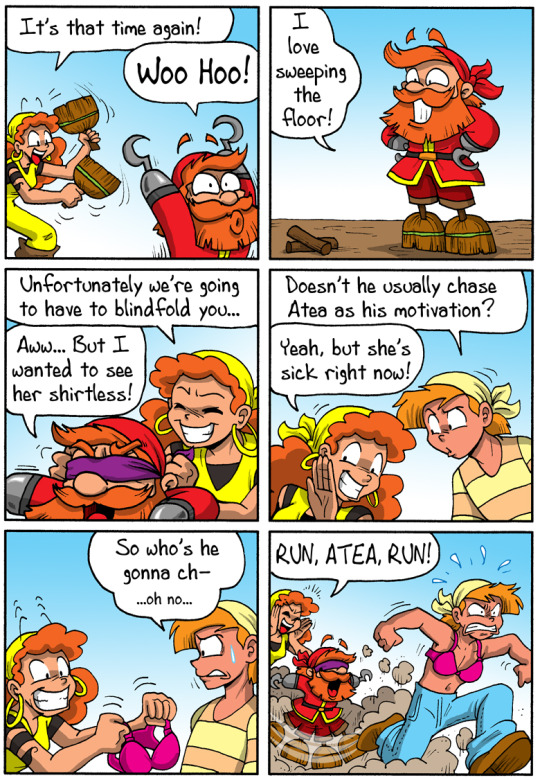
And it is back to business as usual.
... How much would I need to pay for someone on the internet to write an alternate ending to the story where it turns out Sam actually poisoned the food at the party and while Alex is slowly dying, a now evil Sam who has finally broke under years of abuse, is going to become a genuine threatening pirat? that is after he villain monologues to Alex how much she sucks before scalping her?
Wow, I am entering a dark place right now. I think I need to take a break.
So I am going to give my final verdict on this story with the next post around the weekend most likely. Cause that is how much time I will now spend rereading One Piece and watching the Pirates of the Carribean movies in addition to playing the Pirates level of Kingdom Hearts 3, in order to forget this shit and remind myself why I think pirates are cool.
#andrew dobson#alex ze pirate#fuck you#hat andy#tom preston#so you are a cartoonist#syac#comic#webcomic#pirates#sam the cabin boy#atea#talus#one piece#magic of friendship this is not
69 notes
·
View notes
Note
I feel you on the Luka thing. At first I thought he was nice and I was mostly ambivalent about him when he was introduced (adored Kagami though even then) and I was mostly eh about Lukanette (not my thing) but how his terrible stans are acting and their Adrien bashing basically made Lukanette a NOTP for me unless it’s past Lukanette. Your fic and guardiankarenterrier’s have been the only actual Luka content I truly enjoy (excluding more crack ish content like Lukatar and Luka x XY)
Honestly, that’s exactly how I feel about Luka right now, and I’m gonna make a longer post now that I know that I’ve got some agreement and support. So here are my full 12 am rambling feelings about Luka Couffaine and Lukanette, where I essentially hijack your ask and finally make my post. And I’ve only been sitting on this for this long because I didn’t see any point in annoying the salters and rabid Luka stans for the sake of an opinion but…fuck it, y’know? Fair warning that if you like Luka and/or you’re a salter, you might not want to read this.
Luka’s nice. That’s it. He doesn’t have any substance beyond that. He exists purely to serve Marinette, because every other character dares to not fall to Marinette’s feet and cater to her every whim so they are therefore evil.
And no, that’s not Marinette salt. That’s salter salt. Reflecting back on my salt days, the thing that sticks out to me most is the level of protagonist-centred morality and the sheer inability to see from anyone else’s POV. Take Chameleon, for example. Adrien doesn’t know that Lila threatened Marinette. The classmates have seen Marinette act jealous before and their perception of Lila is that of a nice girl who’s being targeted by Marinette. And if you fail to take yourself out of Marinette’s head and see how others might perceive a situation, that’s where most of the salt is born, because all that comes to matter is that Marinette Is Wronged and anyone who dared to not support her 100% is immediately Evil. Never mind that Adrien fought back against years of conditioning to lie down and take it in order to stand up for Marinette and even bargain himself to Lila to protect his friend. Never mind that Alya went to great lengths to prove Marinette’s innocence and even if she didn’t believe Lila was the culprit, she wholeheartedly believed that Marinette was innocent.
But that’s not enough nuance for salters and Perfect Marinette can’t dare to have flaws beyond being clumsy and Too Giving For Her Own Good, so meh. I swear this relates to Luka and I have a point
And that’s where Luka comes in. It’s because he’s a blank slate that he appeals to salters. They can project whatever they want onto him; turn him into the Perfect Boyfriend for Perfect Queen Marinette. He’s not a character. He’s a device. And that’s part of why my interest in him just…waned. There’s nothing to keep my attention hooked. Sure, ‘Silencer’ made me squeal because of the love confession, but only by forcing myself to go back and rewatch it for that rush. Once the episode was over, I just kind of…shrugged. Whatever. He said a few words and then walked off, and Marinette can’t be that in love with him if the confession’s never again brought up in his later appearances; where Adrien’s actively pursued Kagami, Marinette’s just kind of let Luka woo her and gone along with it whenever he’s around. And there’s nothing wrong with letting someone woo you, but when she’s been shown to actively pursue Adrien, it kind of doesn’t give the impression that she’s all that into Luka.
Honestly, it’s pretty much just this shitty meme that I made for a laugh
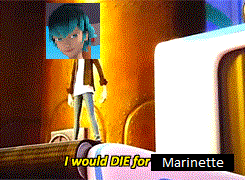
And why does he love Marinette? He “fell for her at first sight”. Marinette and Adrien didn’t fall for each other as soon as their eyes met, but rather after they worked past their initial impressions and revealed a different side to their partner; one that made their partner fall in love with them. Chat’s first impression of Ladybug was of a clumsy, nervous girl who was nice and who he liked but was reluctant to be a superhero in the first place. Marinette’s first impression of Adrien was of a spoiled brat. It wasn’t until Ladybug gave her speech to Hawkmoth and showed her fiery and determined side, until Adrien revealed to Marinette that he was a sweet and socially awkward boy, that they fell for each other. Even Adrien and Kagami had a heckuva lotta chemistry during their first meeting, with Kagami thoroughly impressing Adrien, and Marinette and Kagami’s friendship was established by working past their misunderstood first impressions, just like with Marinette and Adrien. Each of these relationships have a solid foundation based on working past incorrect first impressions and developing a mutual respect. There’s effort that’s been put into these relationships.
And people wonder why I ship Kagaminette so hard.
But Luka? He just took one look at Marinette and was like “mmm pretty girl”. He didn’t fall for her based on anything that he knew about her other than that she stuttered (which he made fun of, and you just…don’t do that with someone you’ve literally only just met). It made me question the legitimacy of her being “the melody inside his head since they first met” because like…their first meeting was talking for two seconds and then her convincing him that she could lockpick a little later on. Every other interaction after that? Still not enough to warrant Luka giving that whole speech to her. And their few interactions since then have been ’Frozer’, ‘Silencer’, and ‘Desperada’. Plus, he doesn’t talk to Marinette. He talks at her. Every interaction is him saying “You feel like this” and strumming his guitar, which…boy, it’s not healthy to speak for the person you’re romantically into, because that’s just gonna lead to a whole lot of miscommunication later down the line.
It could be a flaw that Luka falls hard and fast and he needs to learn to step back and get to know someone before going in. It’d just be nice to have enough substance to him to actually be able to make this conclusion. Maybe I’m just too aro to understand love at first sight.
And how old is he? 16? 17? Thirsting after a 14/15 year old? I didn’t even realise the age gap until now but Jesus, maybe he should find someone his age instead of going after a younger teenager.
And all the diehard Luka stans are also why I’ve grown to just not care about Luka. The way they demonise every other character and push Lukanette as Perfect and Pure - not through being flawless but basically through being Right and not doing any wrong except for a few teensy mistakes that are laughable - was enough to begin to turn me way off, and then from there I just slipped further and further from salt. That’s why, after I finished writing Défenseure, I just threw my hands up and wondered what the hell I was doing with my life. Every Lukanette salt fic is exactly the same. Same plot, same characters demonised with maybe a little variation if the writer’s feeling daring. There’s a reason so many of us are getting sick of salt, especially Chameleon salt. It’s all been done before. So many times. And that also contributes to Luka’s blandness, purely because fandom Luka is just as one-dimensional as canon Luka. I don’t care about canon Luka. But fandom Luka? I cannot stand, and it’s thanks to these diehard stans.
You know, for all the salters claim to loathe Adrien for being so Perfect, they sure seem to turn Marinette into a real bright figure of perfection. That irony is part of what made me turn away from salt in the first place.
There’s a saying that’s stuck with me since my early days of fandom, back when I was into HP and bashing was rampant: if you have to utterly destroy one character to make another look better, you’re only proving how bad the second character is. If you have to make Alya into a horrific demonic bully to justify promoting Chloé to Marinette’s new bestie and essentially switch their personalities, that says a lot more about Chloé than it does Alya. If you have to turn Adrien - who does not know boundaries because he was only ever taught to let people treat him like a piece of meat but who’s learning, to the point of standing up to Lila for Marinette and never once forcing himself on Ladybug whether physically or emotionally - into a horrific Nice Guy caricature just to justify Lukanette, that says a hell of a lot more about you than it does Adrien.
And that’s all I’m gonna say because it’s like 12.30 am and this is way more energy than I wanted to expend on Luka Couffaine. Tl;dr - he’s nice but that’s literally all there is to him. And nice isn’t a personality. It’s one trait.
#miraculous ladybug#fandom salt#ml analysis#ask#aotq babbles#luka couffaine#luka salt#anti-luka#anti-lukanette#anti luka#anti lukanette#god i’m so tired#i’ve been sitting on this for so long
102 notes
·
View notes
Text
Lil Pump Versus The Elderly: A Long and Storied History
Letter From the Editor: The writer of this piece would like to apologize in advance for the abject stupidity contained within the following wall of text. If you’re brave enough to subject yourself to the mania that’s about to unfold, then you have my admiration, gratitude, respect, and appreciation. Thank you for understanding, and may God have mercy on your soul.
Pumpology 101: The Mystifying Origins of Gazzy Garcia

Lil Pump is a dreadlocked 17-year old rapper from Florida who first began making waves in late 2016 when his song “D Rose” became an unexpected viral hit. Over the span of a few short months, the wrist-obsessed track had garnered millions of plays on Soundcloud and over one hundred million curious YouTube clicks. By the end of 2017, Lil Pump (whose real name is Gazzy Garcia) had established himself as a mainstream success when his song “Gucci Gang” peaked at #3 on the Billboard charts. Spawning from his self-titled debut, the alliterative hit quickly became the focal point of a heated debate on the declining state of rap music rap music, the ongoing idocratization of popular culture, and the bare minimum required to pass for lyricism in the year of our Lord 2017.
Expertly covered by both Rolling Stone and The New York Times, Mr. Pump has become a figure at the forefront of the budding “Soundcloud Rap” movement. This subgenre is a spin-off of Trap that’s focused on crafting a particular brand of blown-out, vapid, and repetitive hip-hop that, while lyrically substanceless, still manages to be catchy, memorable, and (most importantly) energetic. It’s hype-up music that’s been distilled so many times that words practically don’t matter.
I’ve already discussed my conflicted feelings on the genre back in August, and while some members of this scene are still objectively-horrific human beings, I’m willing to admit that I’ve come around to Lil Pump thanks to the catchiness of the aforementioned “Gucci Gang.” While the man himself should never be looked up to as an idol, Garcia is still making exciting creations within a field that I’m morbidly fascinated by.

The Lyrics (or Lack Thereof)
Like most rappers, Pump’s songs typically center around the same award-winning trifecta of drugs, money, and women. What makes “Gucci Gang” unique is the fact that it ticks all these boxes while also managing to be accessible to a mainstream audience. Soundcloud Rap’s previous biggest success came in the form of “Look At Me!,” a song whose lyrics are probably just a touch too edgy for mainstream audiences.
Meanwhile “Gucci Gang” has just the right mix of garish colors and catchy lyrics, both of which are accompanied by a distinct feeling of “newness” that helped it stand out from the crowd. Additionally, the song’s bouncy three-syllable chorus proved perfectly memeable, ripe for parody, and endlessly reworkable, all of which led to a song that hit, and lingered in the cultural consciousness for longer than anyone ever expected. Possibly even a reflection of our society at large, “Gucci Gang” is an undeniable success no matter how you cut it.
Outside of the song itself, Lilliam Pumpernickel has also gained fans through numerous extra-musical antics including second-floor balcony jumps, a love for iCarly’s Miranda Cosgrove, and a running joke that he’s a Harvard Graduate. Essentially, he’s not afraid to be a meme, and that lack of fear makes him even stronger. Complete with his own catchphrase, there are many reasons to be entertained by Lil Pump, and all of these elements combined help explain his meteoric rise to success.

The Emergence of an Astronomical Happening
Though my numerous listens to “Gucci Gang,” I began to approach the song the same way that many others did: first with curiosity, then ironic enjoyment, then genuine adoration. I can’t stress enough that the lyrics are nothing to write home about, however one stanza in particular stands out amongst the rest like a bright, shining star:
My lean cost more than your rent, ooh (it do)
Your momma still live in a tent, yuh (brr)
Still slangin' dope in the 'jects, huh? (yeah)
Me and my grandma take meds, ooh (huh?)
These bars initially seemed like a single metaphysical barb amongst a sea of relatively-straightforward brags and boasts, so I explained them away as a one-off lyric with no deeper significance. Unbeknownst to me at the time, this line was just the tip of the iceberg.
By the time December had rolled around, “Gucci Gang” had won the honor(?) of being recognized not once, but twice in Swim Into The Sound’s 2017 Un-Awards. While part of a largely-negative post, I shined a relatively-positive light on “Gucci Gang” as my second-biggest “WTF” moment of the year (second only to Bhad Bhabie) in which I found myself surprisingly endeared to both equally-trashy artists. Later on in the proceedings, I cited the lyrics above specifically as the single “Weirdest Flex” of 2017 (barely edging out a Drake lyric about napping).
In researching the Pump-penned lines for that write-up I found myself jumping between various Genius pages and in doing so, I quickly began to uncover a conspiracy deep as the Carly Rae Jepsen Cinematic Universe: Lil Pump has an unshakable fixation with the elderly.

The Quest For A Universal Truth
It’s no secret that artists tend to use the same concepts, thoughts, and ideas over and over again throughout their work. Usually in hip-hop, these recurring topics (like drugs, money, and women for instance) are framed by using twists on conventional language that are given new meanings within the scene’s culture. From “bricks” to “bands” to “bitches” every possible theme has dozens of different synonyms that can be switched out interchangeably to keep the rhyme fresh and the topic from going stale.
However, slang goes in and out of popular vernacular like the tides of the ocean, and Monsieur Pump is not above these familiar tropes. While drugs, money, and women remain the primary topics around which Pump waves his tales, he, on more than one occasion, has used his grandma, or the grandmother of the listener as a reference point for these interests.
Of course he likes lean, and naturally, he talks about it, but what makes Pump unique is his ability to relate that commonplace idea to the elderly in a hilarious and unexpected way. He’s using age as a barometer by which to measure his own life; the elderly representing an extreme through which he can cover these well-trodden topics.
It’s quite the signature flair for a 17-year-old to brandish, but perhaps through these lines he’s revealing his own obsession with death and mortality. Maybe these grandparent-based lyrics are allowing us a brief peek into the inner machinations of Lil Pump’s mind and we are learning what troubles him on a deep, cosmic, existential level. The philosophical reaper that keeps him up at night. These lines act as an illumination of the human experience as told through the grounded eyes of one man who yells “ESKETIT” like it’s his Pokemon name. What follows is a comprehensive list of every time Little Pump has rapped about senior citizens. You are welcome.

Exhibit #1 - “Gucci Gang”
My lean cost more than your rent, ooh (it do)
Your momma still live in a tent, yuh (brr)
Still slangin' dope in the 'jects, huh? (yeah)
Me and my grandma take meds, ooh (huh?)
For the sake of completeness, we’ll begin with lyrics that started it all. The quote above comprises exactly 25% of the sole verse found on Lil Pump’s breakout hit “Gucci Gang.” In it we find Pump surveying his surroundings, living situation, and pattern of systematic drug use over a bassy beat and twinkling piano line.
First, we get the worrying comparison between the upkeep of his own opiate addiction to monthly rent, then the (uncalled for) implication that the listener’s mother is homeless, and the final cherry on top: the fact that Pump spends quality time popping pills with his grandmother. While the specifics remain vague here, it’s implied that he’s taking drugs recreationally while she is taking them for health reasons.
This being one of Pump’s numerous references to the elderly, the topic’s pervasiveness now leads me to believe that this is both a genuine lyric, as well as a thinly-veiled cry for help. As distressing as the lyric may be, at least he’s spending some quality time with his elders before they pass. Even if it’s a drug-fueled haze, I hope that both parties treasure their remaining time together and cherish each other's company.

Exhibit #2 - “Fiji”
I got Fiji on my neck
I got Gucci on my chest
And my grandma sippin' Tech
Off a Xan like Ron Artes
In this one-off Lil Pump loosie, Young Gazzy uses the artesian water brand as a descriptor for both his jewelry and his sex life. Following a similar structure as “Gucci Gang,” this track features a brief intro, and one verse sandwiched between two short choruses. Clocking in at a mere 88-seconds, “Fiji” is a striking minimalist creation that embraces reductionism and revels in ambiguity.
Within the world of hip-hop, “Water” can actually mean many things. From sex to swagger, the use of ‘water’ in-song is generally something you have to pick up from context clues, and this track is no different. In “Fiji” Pump walks a beautifully-ambiguous line between these typical definitions of earthly possessions and literal water, turning the brand’s name into a primal chant of “I pour Fiji on her neck.”
After a brief water-laced refrain, Pump proceeds into the meat of the song: a 45-word verse that discusses his public persona and ticks all of the seemingly-mandatory drug-based name-drops. He has jewelry on his neck, a Gucci logo tattooed on his chest, and most importantly the incongruous mention of his grandmother casually enjoying some hitech (aka Lean).
Perhaps elaborating on the lines of “Gucci Gang,” this lyric implies that maybe he and his grandmother both enjoy drugs on the same recreational level. Later on in the song he continues:
Slice your auntie in the neck
Lil Pump disrespect
Run up on you with that 40
Grab your grandma by the neck
After the verses earlier drug revelry, Pump seems to “set his sights” on the listener, attacking us via multiple familial ties. In a single moment of clarity he utters “Lil Pump disrespect” as if he knows what he’s doing is morally reprehensible, but remains out of his control. A haunting sentiment to say the least.
His hunger is insatiable, and your grandmother is his target. Violence is the only thing he understands, and your grandmother is the only thing he can grasp onto, both physically and metaphorically. And then, just as suddenly as the attack unfolded, the song fades into nothing, leaving the listener in the bloody aftermath.

Exhibit #3 - “Smoke My Dope”
Whippin' up dope in the trap spot (what)
Sellin' cocaine to your grandma (yuh)
Whippin' up dope in the trap spot (yuh, yuh)
Sellin' cocaine to your grandma (yuh, yuh, yuh, yuh)
In this early-album cut Lil Pump and fellow Florida rapper SmokePurpp trade verses for a compact and chaotic 2-minutes. In Garcia’s second verse he exerts himself enough to present one specific instance of creating and selling drugs over a series of escalating “yuh’s.”
In this simplistic portrayal of Pump’s supply chain, he gives his process away to the listener:
Whip up an indeterminate amount of “dope” within the “trap”
Proceed to sell that cocaine to the listener’s grandmother
Perhaps connected to the seemingly-uncalled-for violence depicted on “Fiji,” these lines seem to explain how Pump has obtained his wealth. I imagine that the elderly are comparatively easy-going when it comes to the purchase and intake of drugs, so it’s presumably easy money for Pump and a decent enough business model. Backed up by voracious twitter claims that echo the song’s lyrics, Pump has given us no reason to doubt him or his business acumen when it comes to selling the white stuff to the Greatest Generation.

Exhibit #4 - “Had”
My loud pack smell like fish tank
My backwoods filled with dumb stank
I can't fuck with you, cause I know all you ni**as stains
My grandma selling loud pack and she selling cocaine
She run up on your block and she'll shoot you in the fuckin' brain
With “Had” it seems that there’s a new wrinkle to Pump’s drug operation as it’s revealed that he’s running a family business by employing his grandmother as a key player.
Depicting his bubbe as savage and violent as himself, this example could possibly explain Pump’s own outwardly-destructive actions as a learned behavior. In portraying a systematic issue within our society, this line directly tackles how family can fail us, or lead us to repeat the same mistakes as those that came before us. It’s a tortured and agonized call for help as Pump removes himself enough to realize the trauma that he has indirectly absorbed and the conditions that he has had no choice but to grow up in.
This all said, it’s still nice that people like Pump’s grandmother can find purpose in the fast-paced working world and be driven by the fulfillment of a hard days work. The fact that she’s willing to kill on top of the drug dealing means that she’s committed to the cause, and is likely quite experienced, even in her old age. At the very least, Pump must come from good genes!
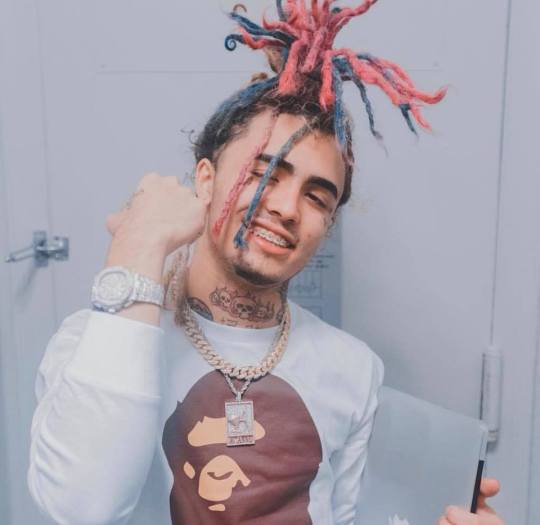
Exhibit #5 - “At The Door”
I got junkies at the door
I could serve you 2 for 4
I could serve you couple Xans
I could feed your bitch some coke
Yeah my Uzi automatic
Make your grandma do a backflip
On this mid-album cut, we see yet another allusion to the violence that Pump has inflicted upon the listener’s grandmother specifically. Perhaps wielded by Pump himself, or maybe even his grandmother (as we saw in “Had), it appears as if the drug dealing illustrated on “Smoke my Dope” has gone sideways for one reason or another, and Pump has been forced to resort to violence.
This line is actually one of the multiple familial references within this verse, the others being father, daughter, and aunt, so while this reference fits squarely in the bounds of the topic at hand, there’s no getting around the persistently-elderly angle that Pump takes.
This is yet another line later echoed in a Tweet by Pump, either lending further credence to his unfeeling savagery, or (perhaps) his commitment to our society’s collective physical fitness by inspiring the elderly to do advanced-level gymnastics.

In Conclusion
None of this was good. While Pump’s initial references to the elderly seemed to be a twisted form of mutual enjoyment, things quickly devolved into selling drugs, and eventually inflicting violence directly on the listener's grandmother.
This analysis is absolute stupidity, but I find it too amusing that a 17-year-old who has so few songs officially released has referenced the elderly half a dozen times throughout the history of his recorded work. The way I see it, there are a few explanations for this lyrical ouroboros:
It’s a creative crutch.
Lil Pump has that little to say that he keeps defaulting to “grandma.”
Deep-seated familial trauma in his own past that Pump may or may not be cognizant of.
Pump thinks that the savagery of his grandma implies, dictates, and directly translates to his own.
By “attacking” the listener and showing disregard for their loved ones, his devil-may-care attitude is preemptively deflecting any criticism they may have of Pump or his music.
Lil Pump truly does fear the uncertainty of death and projects that concern through the multiple references to the elderly in his music.
It very well could be all or any combination of all of these, but in any case, I feel it’s safe to say that this qualifies as an unhealthy fixation. Whether it’s a profound fear of death, a thinly-veiled attempt to address his own mortality, or irreconcilable childhood trauma, I genuinely hope that Gazzy Garcia can get the help he needs to get over this mental block.
He’s still got many years ahead of him, and a full life to live. If he wants to make it to the status of “Grandpa Pump” he’ll have to overcome this irrational fear and tackle his issues head-on, or else they will continue to emerge in unhealthy ways.
Here’s to you Mr. Pump, I hope you get the help you need and deserve.
I’m sorry for writing this.
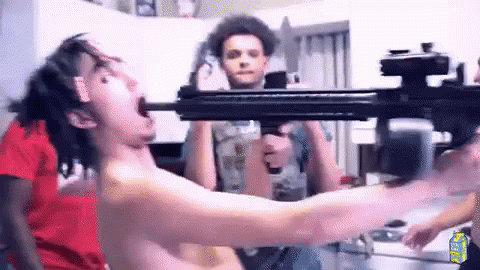
2 notes
·
View notes
Text
J. Edgar

J. Edgar is a flawed biopic from Clint Eastwood that continues to show that his late period fact-based stories always seem to lack something that to make them rise above the trappings of the facts they are based upon. Starring Leonardo DiCaprio as the head of the FBI, J. Edgar Hoover, the film focuses on him starting the agency and the period right before his death. Both show a man fearlessly holding onto his baby and ensuring that it is established as the foremost expert on all matters of crime. Along the way, we see the impact his mother Anna Marie (Judi Dench) had on him, his clearly gay relationship with Associate Director Clyde Tolson (Armie Hammer), his trusty secretary Miss Gandy (Naomi Watts), his obsession with communists, his obsession with organized crime, assisting in the Lindbergh baby case, his dealings with political leaders such as MLK, and his dealings with presidents. All the while, he builds up the agency to nearly being the behemoth we see today. Though well-constructed, J. Edgar has some fundamental flaws that keep it from being successful.
Foremost is the make-up. It may be odd to start here since there are some narrative issues and cinematography issues that also plague J. Edgar, but it only makes sense given how absolutely horrific the make-up is in this film. While DiCaprio and Watts' old age make-up are quite bad, it is really the make-up caked onto Armie Hammer's face that stands as the worst. Throughout much of the film, particularly when Tolson has a stroke, he looks more like a CPR test dummy than a man (or like this meme). His emotions and facial expressions are necessarily overdone and too expressive as Hammer must force his way valiantly through the make-up that undoubtedly made him feel caged within his own body. That said, he is hardly the only one with bad make-up in this film. DiCaprio's is also very bad and never looks authentic. It looks like DiCaprio wearing a lot of make-up and never really makes the audience suspend their disbelief regarding his characters' age.

Narratively, the film never finds a way to use the make-up either, which may make it even worse. Overly convoluted and confusing for a biopic, Eastwood's film freely skips between the 1920s/1930s to the 1960s/1970s without ever really letting you know what year we are in and what situations we are in beyond just tossing Hoover into major cultural touchstones of the 20th Century. Having Hoover dictate his autobiography to a staff member - which was not true anyways - reveals just how slipshod this film really is as we jump from year-to-year without order and go long stretches in the past or present before the film seems to realize we have not seen the other time period in a long time. While it may make sense to use this screenwriting shortcut to tell the story, it really makes the film feel incredibly disjointed and lacking any sort of cohesion. This convoluted approach to telling a story where Eastwood constantly leaves off in the middle of a timeline before jumping to a new one really hampers J. Edgar and makes it feel overlong, poorly paced, and exasperatingly dull.
J. Edgar also struggles when considering the lighting. Now, I love noir films and shadows. Yet, this film is too much. Now, it is not noir, but the chiaroscuro feels pulled directly from those under-budgeted 1940s Warner Bros. noirs and Eastwood seems to try and capture that feeling for this biopic. It is ill-fitting and overdone with faces sometimes entirely obscured by shadows. This really hinders many moments in Hoover's office where we can hardly see the man or the people he is talking to. This may be hinting at some thematic considerations on the part of Eastwood, but if they are, they are never fully realized and really miss the mark.

Now, all of that said, the acting is quite good. As is typical, for DiCaprio, he delivers an excellent lead performance as Hoover and really captures his great power and presence, while still maintaining the other elements of his life quite capably. In particular, these "other elements" include his homosexuality, which is nicely portrayed by Eastwood with a gentle approach. Showing the secrecy that they must live in with Edgar and Colson restricted to slight touches of the hand and two brief kisses, the film shows both the troubles at the time and gives a tender look at the personal and intimate life of such a tough man. Their relationship is not just well-written and nicely handled, but DiCaprio's excellent performance is matched by a similarly terrific performance from Armie Hammer, who plays the only man that really ever understood Hoover at his most vulnerable, being able to quickly tell if he is lying or not.
It is the aforementioned development of this homosexual side of Hoover that really reveals the most about him and how reserved of a person he was. He accepted very little distraction from his work, aside from Colson and his mother. Interestingly, they represent foils. Colson accepts his homosexuality, loves him anyways, and yet is unafraid to challenge him positively. His mother is mostly negative. She is tough and criticizes his failure to save Lindbergh's baby, while also telling him she would rather he be dead than gay. However, she undoubtedly loves him. The two have a unique and special relationship where he still lives with her throughout the rest of her life, even when he is the director of the FBI. This acceptable of these limitations to her love really do speak to how much he loved her and wanted to change himself. Often, he pushes Colson away because he too rejects his homosexuality. How could the leader of the nation's biggest law enforcement agency be gay? It was inconceivable and Hoover knew this. Thus, he had to find ways to push away Colson, driving him towards women at the urging of his mother. This split personality between what he shows the world and is like behind closed doors shows how complex of a man Hoover was and the emotional turmoil he underwent as a result of his homosexuality. For all of the film's narrative faults, it really does paint a compelling picture of Hoover's personal life and his struggles to balance this with his macho stances in public, particularly with how being gay was perceived during his lifetime. In many ways, his homosexuality and inability to channel his passion into a relationship that he could be entirely committed to, could be cited as how he was able to build up the FBI. Entirely married to his work, he never showed any interest in having a life outside of work and instead focused all of his energy on the job. His extreme passion about communism and organized crime, as well as to restoring patriotism and morality to a country he sees as being devoid of both, essentially replaces that emotional side of him as he seeks a way to define himself in the public and to stave off internal questions about his masculinity.

This interesting character study does lend itself nicely to a compelling story that recounts the major cases of the FBI during his time as director. Though it may be too ambitious to do both, and the film feels stretched out as it tries to cram in more investigations, it is quite admirable and interesting to watch. In particular, the Lindbergh case takes up much of the runtime and is always engaging as we watch them try and find the people responsible. The introduction of the personal files also adds another layer to the film, particularly when Nixon (Christopher Shyer) becomes President and when Miss Gandy is tasked with destroying them after Hoover's death. It not just shows Hoover's killer instinct with how he is willing to use it against his enemies, while adding tension with regard to how he will use the information. Additionally, though the film's pacing is definitely off, the stories it tells are always interesting and are matched by excellent costume design. In its crime tales, it often mirrors a gangster film with the big guns, boiler hats, and suits. This costume design brings great authenticity to the time period of the story and somewhat makes up for the awful make-up.
The definition of a mixed bag, Clint Eastwood's J. Edgar is an ambitious biopic with excellent acting performances, a terrific exploration of what made J. Edgar Hoover tick, great costume design, and a compelling story. However, its awful make-up, fractured storytelling to the point that it is convoluted, poor pacing as a result of trying to fit in too much, and awful lighting, really cancel out many of the positives. That said, it is worth a watch for lovers of history or those who appreciate watching terrific actors turn in terrific performances.
#film reviews#film analysis#2011 movies#2010s movies#j. edgar#j. edgar movie#j. edgar hoover#leonardo dicaprio#armie hammer#naomi watts#judi dench#clint eastwood
0 notes